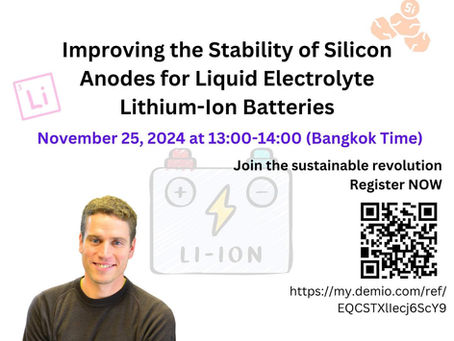top of page

Webinar Series
Webinar Series on Energy Storage and Transition led by a specialist in a field related to energy transition. Following each webinar, we will hold question-and-answer sessions and panel discussions to boost interaction and idea sharing. We will also gather and share useful resources like articles, reports, and case studies on energy transition, helping participants deepen their understanding.


Sodium Halide Solid State Electrolyte with High Ionic Conductivity | Laisuo Su
All-solid-state batteries (ASSBs) are a promising next-generation energy storage technology, offering enhanced safety by replacing...
Asst. Prof. Dr. Laisuo Su
Sep 29, 20251 min read


Copper-based electrocatalysts for CO(2) valorization at industrially relevant conditions
The electrochemical reduction of carbon dioxide ($\text{CO}_2$$\text{RR}$) using carbon-neutral electricity offers a sustainable pathway to produce valuable chemicals like formic acid, carbon monoxide (CO), and multi-carbon products. However, direct CO
2
conversion faces challenges due to competing carbonate formation, which leads to increased hydrogen evolution and electrical resistance.

Dr. Hong Phong DUONG
Jul 18, 20251 min read


Scalable and efficient artificial photosynthesis
The development of sunlight-driven water splitting or CO2 reduction systems with high efficiency, scalability, and cost-competitiveness is a central issue in the mass production of fuels and energy-rich chemicals.

Professor Qian Wang
Jun 24, 20251 min read


Solar Reforming : Powering A CircularEconomy Through Sunlight-Driven Technologies
Thailand has developed a sustainable logistics system for recycling lithium-ion batteries (LIBs), involving multiple stakeholders, as illustrated in the diagram below. This system plays a key role in promoting a circular green economy.

Dr. Subhajit Bhattacharjee
Jun 4, 20251 min read


Understanding and preventing failures in solid-state batteries
📆 Date and time: Jan 13, 2024 04:00-05:00 PM Bangkok (09:00-10:00 AM UK Time) ✒️ Assist. Prof. Dominic Spencer-Jolly ...

Assist. Prof. Dominic Spencer-Jolly
Jan 13, 20251 min read


Flux growth technology for regenerating lithium-ion battery materials
Thailand has developed a sustainable logistics system for recycling lithium-ion batteries (LIBs), involving multiple stakeholders, as illustrated in the diagram below. This system plays a key role in promoting a circular green economy.

Prof. Katsuya Teshima
Dec 9, 20241 min read


Improving the Stability of Silicon Anodes for Liquid Electrolyte Lithium-Ion Batteries
📆 Date and time: Nov 25, 2024 01:00 PM Bangkok ✒️ Dr. Nicholas P. Stadie Associate Professor of Physical Chemistry...

Dr. Nicholas P. Stadie
Nov 25, 20241 min read


LIBs Recycling Process: Crushing Unit Development
Thailand has developed a sustainable logistics system for recycling lithium-ion batteries (LIBs), involving multiple stakeholders, as illustrated in the diagram below. This system plays a key role in promoting a circular green economy.

Prof. Dr. Nurak Grisdanurak
Nov 18, 20242 min read


High-Rates Capability of High Nickel-Free Cobalt NMA as Cathode for Lithium-Ion Batteries
LiNi0.9Mn0.1-xAlxO2 (Li-NMA) cathodes (x = 0.01, 0.03, 0.05) were synthesized via co-precipitation and calcination. XRD confirmed a well-formed hexagonal structure. LiNi0.9Mn0.07Al0.03O2 (NMA 973) exhibited superior electrochemical performance, showing lower redox peak separation, the smallest charge transfer resistance (29.69 Ω cm-2), and a high specific discharge capacity of 172 mAh g-1 at 0.1C after 100 cycles. It also demonstrated excellent capacity at high current densit

Dr. Lukman Noerochim
Nov 11, 20241 min read


Advanced Metrology for Studying Catalyst Degradation & Li-ion Battery Drying Process
Insightfully understanding the process of volatiles from plastic depolymerization entering from the exterior into internal structure of catalyst favors to rationalize the catalyst design in scale-up principles. Herein, catalytic degradation of plastic wastes with fluid catalytic cracking catalyst (FCC) was investigated in-depth.

Dr. Yeshui Zhang
Nov 8, 20242 min read


Sunlight-Powered Waste-to-Value Conversion
The world confronts critical challenges from energy crisis and global warming, primarily stemming from fossil fuel dependence and CO2 emissions. Urgent action is needed to mitigate these emissions and transition to a circular economy. This article investigates carbon capture and utilization (CCU) for recycling CO2 into valuable molecules using renewable energy. It also addresses plastic pollution, proposing solar-driven photoelectrochemical systems to convert CO2 and waste pl

Dr. Motiar Rahaman
Nov 1, 20241 min read


Unlocking Innovation and Biophilic Development for Sustainable Tropical Cities
The pursuit of mitigating climate change is crucial for achieving Sustainable Development Goals, especially in tropical cities that are disproportionately affected by urban heat islands. This innovative approach integrates carbon neutrality, sustainable energy generation, and biophilic development to create thriving and resilient urban environments, emphasizing the connection between humans and nature.

Prof. Ariya Aruninta
May 10, 20241 min read


Life cycle assessment of greenhouse gas emissions regarding passenger vehicles in South Korea
To achieve carbon neutrality, it is important to understand the holistic effect of applying a new technology, in order to avoid un-intended emissions either in upstream or downstream processes due to such application. In estimating the holistic effect, one of the most promising and accepted methodologies nowadays is life cycle assessment (LCA). The history of standardized LCA started mid ’90s, but it is only recently that LCA is widely adopted in various government rules and

Prof. Han Ho Song
Mar 15, 20241 min read


Pathway toward Carbon Neutrality in Thailand’s Electric Power Sector
To avoid the potential adverse impacts of climate change from global warming, it is suggested that the target of net zero emissions should be reached by this mid-century. Thailand is aiming to achieve carbon neutrality by 2050. Since electricity generation is one of the largest producers of carbon dioxide emission, the associated emissions must be greatly reduced. New generation expansion plans should also be well developed.

Assoc.Prof.Dr.Kulyos Audomvongseree
Mar 8, 20241 min read


Predictive control for congestion management and decision-making on meshed electrical grids with high-power batteries
As renewable energy expands, power grids face growing congestion challenges. This talk presents a two-level control strategy using batteries—combining planning and real-time Model Predictive Control—to manage grid overloads and unlock multi-service capabilities for energy storage systems.

Prof. Sorin OLARU
Feb 23, 20241 min read

52:37

01:02:03

01:02:50

01:16:44

01:10:51

02:11:29
bottom of page
